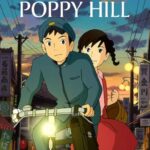Ocean Waves (Umi ga Kikoeru) is a lesser-known but deeply nostalgic film from Studio Ghibli, released as a television movie in 1993. Unlike the grand fantasy adventures the studio is famous for, this film is a quiet, reflective slice-of-life drama about youth, friendship, and the complexities of first love. It tells the story of Taku Morisaki, a high school student in Kochi, whose life is turned upside down by the arrival of a transfer student, Rikako Muto. Through its delicate storytelling, the film captures the bittersweet emotions of adolescence and the memories that linger into adulthood.
Movie Details
| Title | Ocean Waves (Umi ga Kikoeru) |
|---|---|
| Director | Tomomi Mochizuki |
| Studio | Studio Ghibli |
| Release Date | May 5, 1993 (Japan) |
| Runtime | 72 minutes |
| Genre | Drama, Romance, Slice of Life |
| Language | Japanese (with multiple dubbed versions) |
| IMDb Rating | 6.6/10 |
| Number of Reviews | Over 22,000 user reviews |
| IMDb Link | IMDb Page |
A Reunion That Brings Back Memories
The film begins with Taku Morisaki, now a young adult, returning to his hometown of Kochi for a school reunion. As his train pulls into the station, he catches a fleeting glimpse of a young woman at the opposite platform. Though he cannot see her face clearly, he immediately recognizes her as Rikako Muto, a girl who once changed the course of his life. This sudden moment takes him back to his high school days, stirring memories he thought had faded.
A New Student and a Complicated Friendship
Back in high school, Taku lived an ordinary life in Kochi, a small coastal town. His best friend Yutaka Matsuno was the class representative—studious, responsible, and well-liked by everyone. Their friendship had always been strong, but everything began to shift when Rikako Muto transferred from Tokyo.
Rikako was different from the other students. She was beautiful, intelligent, and excelled in sports, but she was also distant and difficult to approach. Many of their classmates admired her, but she kept to herself, seemingly uninterested in making friends. The reason became clear soon enough—she resented having to move to Kochi, believing that the quiet town was dull compared to the bustling life she had in Tokyo.
While most of the class tried to ignore her cold attitude, Yutaka developed a quiet admiration for Rikako. He confided in Taku that he liked her, though he never planned to act on his feelings. Taku, on the other hand, had no particular opinion about Rikako at first, but fate had other plans.
An Unexpected Trip to Tokyo
One day, out of nowhere, Rikako approached Taku with a strange request—she needed to borrow money. At first, Taku was taken aback, but when he learned that she wanted to secretly visit Tokyo to see her estranged father, he reluctantly agreed. This led to a sudden and unexpected trip to Tokyo, where Taku found himself caught up in Rikako’s personal troubles.
In Tokyo, Rikako’s true vulnerability surfaced. She was not the arrogant girl everyone thought she was but a lonely teenager struggling with her parents’ divorce. Her father had moved away, and she resented her mother for forcing her to leave Tokyo. Though she had never confided in anyone before, something about Taku made her open up, even if just for a moment.
The trip, however, created rumors and tension. When they returned to Kochi, their classmates gossiped about why Taku and Rikako had gone away together, and Yutaka was visibly hurt by the situation. Though nothing romantic had happened, the misunderstanding strained the friendship between Taku and Yutaka. Rikako, for her part, refused to clear things up, only making things worse.
A Slap That Changed Everything
The growing tension came to a head during a school trip to Hawaii. Rikako, frustrated and feeling isolated, lashed out at her classmates, calling them provincial and boring. When Taku finally confronted her about her behavior, she slapped him across the face in front of everyone. Without thinking, he slapped her back—a shocking moment that left the entire class silent.
This incident became a turning point. From that moment on, Taku convinced himself that he disliked Rikako. He wanted to move past his feelings, ignore her, and focus on his friendship with Yutaka. But deep down, something lingered—something he could not fully understand yet.
Realizing the Truth Too Late
By the time they graduated, Rikako left Kochi, returning to Tokyo as soon as she could. Taku never saw her again. He thought he had moved on, burying those memories under the weight of time. But as he stood on the train platform, seeing her face for the first time in years, everything came rushing back.
In that brief moment, Taku finally understood what had been buried deep within him all along. He had loved Rikako. Not in an obvious, dramatic way, but in a quiet, unspoken longing that he had refused to acknowledge. The arguments, the misunderstandings, the moments of connection—they all meant more than he had realized.
As he steps onto the platform, a sense of regret washes over him. He wonders if Rikako has forgotten him, if she remembers the slap, the school trip, the borrowed money, and all the moments in between. But then, just as she is about to disappear into the crowd, she turns around and smiles.
And with that, Taku knows that the past, though distant, will always be a part of him.
What Ocean Waves Teaches Us
Ocean Waves is a story about growing up, looking back, and realizing the meaning of moments we once took for granted. It reminds us that:
- Youth is full of emotions we don’t always understand – Taku never realized his feelings for Rikako until it was too late.
- Friendship and love can be complicated – Sometimes, friendships are tested by emotions that we can’t control.
- We don’t appreciate things until they become memories – What once seemed like small, forgettable moments can turn out to be the most meaningful.
My Honest Review on Ocean Waves
This is one of Studio Ghibli’s most unique films. Unlike their usual fantasy adventures, Ocean Waves tells a deeply realistic and relatable story. It is a nostalgic look at first love, youth, and the way memories shape us.
The animation, while simple compared to other Ghibli films, beautifully captures the atmosphere of a small Japanese town. The film’s soft color palette and melancholic music create a sense of nostalgia, making you feel as if you are looking back on your own teenage years.
If you enjoy subtle, character-driven stories that explore human emotions without grand, dramatic moments, Ocean Waves is a must-watch. It is a film that quietly stays with you, much like the memories of youth that never truly fade away.
FAQ – Ocean Waves
1. Is Ocean Waves based on a book?
Yes, it is based on the novel Umi ga Kikoeru by Saeko Himuro.
2. Why did Rikako act so cold and distant?
She was struggling with her parents’ divorce and resented being forced to leave Tokyo, making it hard for her to connect with others.
3. Did Taku and Rikako end up together?
The film leaves their future open-ended, but the final scene suggests that they may reconnect.
4. How is Ocean Waves different from other Studio Ghibli films?
Unlike Ghibli’s fantasy films, this is a slice-of-life romance, focusing on realistic emotions rather than adventure.












